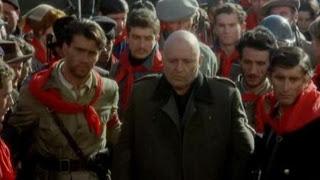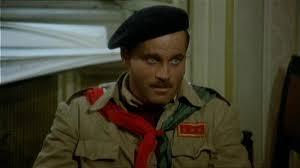 Benito Mussolini's downfall makes for a gripping drama in Last Days of Mussolini (1974), also known as The Last Four Days. Director Carlo Lizzani skillfully recreates the last days of Fascist Italy, offering a complex plot and Rod Steiger's excellent acting.
Benito Mussolini's downfall makes for a gripping drama in Last Days of Mussolini (1974), also known as The Last Four Days. Director Carlo Lizzani skillfully recreates the last days of Fascist Italy, offering a complex plot and Rod Steiger's excellent acting.In April 1945, Benito Mussolini (Rod Steiger) has been reduced to puppet ruler of the Salo Republic, under Germany's direct supervision. With the Axis collapsing, Mussolini plots his escape to Switzerland, using Cardinal Schuster (Henry Fonda) as an intermediary with the Allies. Unfortunately, neither the Americans nor the antifascist partisans have any interest in letting Mussolini escape. Along with his mistress Claretta Petaci (Lisa Gastoni), Mussolini's captured by partisans who debate his fate. Finally, the Italian government sends Colonel Valerio (Franco Nero) to execute the dictator.
Eschewing depraved fascist allegory common to '70s filmmakers, Lizzani opts for sober historicity. Last Days does indulge a few art flourishes, including flashbacks to Mussolini's wartime leadership and a montage of car radios blaring martial music and English, Italian and German announcers, clunky symbolism of the movie's competing factions. Otherwise the movie's relatively subdued, filming on historical locations in northern Italy, including Giulino where Mussolini met his fate.
Lizzani and cowriter Fabio Pittoru creditably craft a human Mussolini. He grows to distrust his advisors, who promise armies of supporters when only a few die hards remain. Marshal Graziani (Rodolfo Del Pra) negotiates with the Allies behind his back and the Germans hold Mussolini under virtual arrest. Shedding his bluster, Mussolini has few delusions about his situation and merely hopes to survive. He's reduced to trying to maintain dignity amidst betrayal from his friends and humiliating capture.
 Meanwhile, a complex struggle over the dictator's fate rages. The partisans want Mussolini dead but squabble over how and where to do it. Americans send a commando team to intercept Mussolini, planning a war crimes trial. Yet the Americans also seem receptive to a fascist functionary's argument that Mussolini could help prevent a Communist takeover of Italy. Hence Valerio, a no-nonsense soldier who cuts through the red tape with single-minded determination. He brandishes weapons at bureaucrats and convenes an ad hoc tribunal to sanction Mussolini's death.
Meanwhile, a complex struggle over the dictator's fate rages. The partisans want Mussolini dead but squabble over how and where to do it. Americans send a commando team to intercept Mussolini, planning a war crimes trial. Yet the Americans also seem receptive to a fascist functionary's argument that Mussolini could help prevent a Communist takeover of Italy. Hence Valerio, a no-nonsense soldier who cuts through the red tape with single-minded determination. He brandishes weapons at bureaucrats and convenes an ad hoc tribunal to sanction Mussolini's death.The ending resembles Nicholas and Alexandra, juxtaposing Mussolini's captivity with arguments about his fate. Valerio wears down resistance to his mission, while the partisans reroute him to a village as American troops approach. Valerio argues about the imperative of punishing Mussolini before postwar compromises. Mussolini and Claretta try and comfort each other under their captors' watchful eyes. When the end finally comes it's both farcical and tragic, though Lizzani spares us the dictator's postmortem mob mutilation.
Rod Steiger gives a creditably restrained performance, showing Mussolini as both arrogant yet realistic about his chances. Steiger grants small moments - his shame at wearing a German uniform, asking partisans for Claretta's privacy - a gravitas that broader acting would have lost. Steiger reprised the role in Lion of the Desert (1981). Franco Nero is perfectly cast, making Valerio a tough man of action exasperated with bureaucratic niceties. Lisa Gastoni is effective, her shrill obsession giving way to touching loyalty. Henry Fonda's role is nondescript and Giacomo Rossi-Stuart isn't a convincing American.
Where Adolf Hitler's downfall was a depraved gotterdamerung, Mussolini's seems more recognizable: self-serving yet defiant to the end, a victim of his own hubris. Too monstrous to be tragic, his dreams of a modern Roman Empire makes his final throes seem pathetic.

